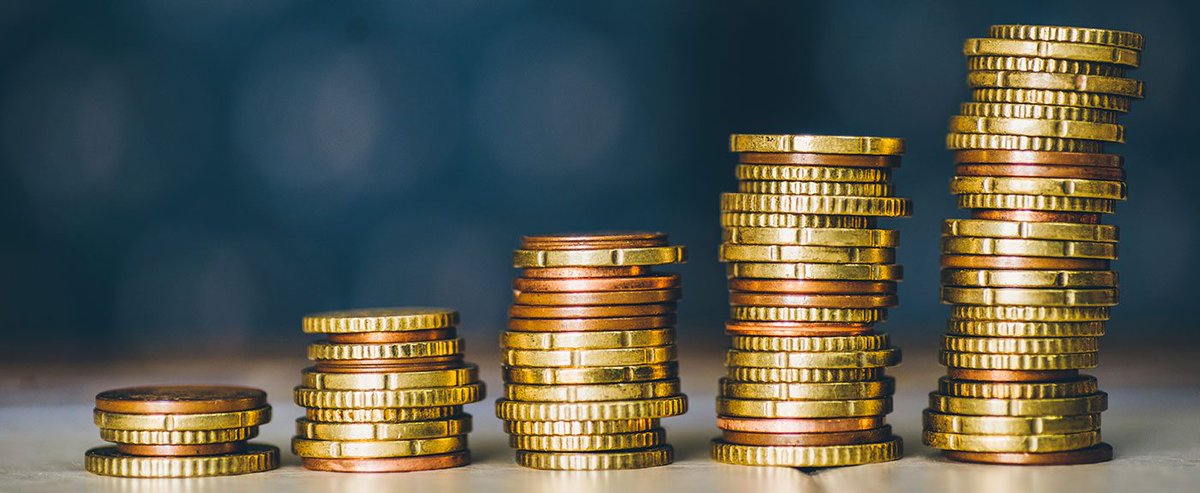Compounding 101
Albert Einstein famously said, "Compound interest is the eighth wonder of the world. He who understands it, earns it; he who doesn't, pays it."
But what is this great wonder and how does it work?
Here's Compounding 101!



Albert Einstein famously said, "Compound interest is the eighth wonder of the world. He who understands it, earns it; he who doesn't, pays it."
But what is this great wonder and how does it work?
Here's Compounding 101!



1/ First, some quick definitions.
Simple interest is interest that is paid only on the initial principal balance.
Compound interest is interest that is paid on the initial principal balance plus the accumulated interest from prior periods.
You earn interest on your interest!
Simple interest is interest that is paid only on the initial principal balance.
Compound interest is interest that is paid on the initial principal balance plus the accumulated interest from prior periods.
You earn interest on your interest!
2/ Let's use a simple story to illustrate the incredible power of compound interest.
Imagine you work for a tech company that was just acquired by Google. You cash out your stock options and receive a windfall of $1 million.
Your colleague Paul is in the same situation.
Imagine you work for a tech company that was just acquired by Google. You cash out your stock options and receive a windfall of $1 million.
Your colleague Paul is in the same situation.
3/ You and Paul both decide depositing it in a bank is the safe move.
Simple Bank offers a high-yield savings account with 10% simple annual interest.
Compound Bank offers a high-yield savings account with 8% compound annual interest.
*Disclaimer: No, these rates are not real.
Simple Bank offers a high-yield savings account with 10% simple annual interest.
Compound Bank offers a high-yield savings account with 8% compound annual interest.
*Disclaimer: No, these rates are not real.
4/ Paul sees the 10% rate from Simple Bank and opens an account, depositing his $1 million.
You, on the other hand, have read the Einstein quote on compound interest, and decide to open an account at Compound Bank.
You're in this for the long-run.
So what happens next?
You, on the other hand, have read the Einstein quote on compound interest, and decide to open an account at Compound Bank.
You're in this for the long-run.
So what happens next?
5/ Paul's 10% simple interest will earn him $100K every year (10% on $1m principal).
Your 8% compound interest will earn you $80K the 1st year (8% on $1m principal), $86K the 2nd year (8% on $1.08m), etc.
You earn more interest every year. Paul earns the same amount.
Your 8% compound interest will earn you $80K the 1st year (8% on $1m principal), $86K the 2nd year (8% on $1.08m), etc.
You earn more interest every year. Paul earns the same amount.
6/ After 1 year, Paul has $1.1 million and you have just $1.08 million. He gloats about his financial prowess.
"Just wait," you tell him confidently.
By year 7, you have leapfrogged Paul.
By year 20, he has $3 million to your $4.7.
By year 30, he has $4 million to your $10!
"Just wait," you tell him confidently.
By year 7, you have leapfrogged Paul.
By year 20, he has $3 million to your $4.7.
By year 30, he has $4 million to your $10!
7/ "You should have listened to my guy Albert," you tell him over the phone from the library in your mansion.
The key here is that with compound interest, you receive the rate of return on both the principal and the accumulated interest.
It creates a snowball effect, of sorts.
The key here is that with compound interest, you receive the rate of return on both the principal and the accumulated interest.
It creates a snowball effect, of sorts.
8/ The same concept applies to stock markets, as the returns of this year compound upon the returns from last year.
Historically, putting money in a market index fund and allowing it to compound (reinvesting dividends) was the simplest, best way to build long-term wealth.
Historically, putting money in a market index fund and allowing it to compound (reinvesting dividends) was the simplest, best way to build long-term wealth.
9/ I'm all for keeping things simple, except when it comes to interest.
Trust Einstein. Whether with savings, investments, or knowledge, let it compound!
Trust Einstein. Whether with savings, investments, or knowledge, let it compound!
10/ Following up on this thread, and inspired by @MorganHousel and his recent book (which is fantastic, by the way!), I'll be be sharing more stories of ordinary people who have built extraordinary wealth through simply harnessing the power of compounding. https://amzn.to/2ZNwgw6
10/ So that was Compounding 101! I hope you found it useful.
And for more educational threads on money, finance, and economics, check out my meta-thread below! https://twitter.com/SahilBloom/status/1284583099775324161
And for more educational threads on money, finance, and economics, check out my meta-thread below! https://twitter.com/SahilBloom/status/1284583099775324161

 Read on Twitter
Read on Twitter


